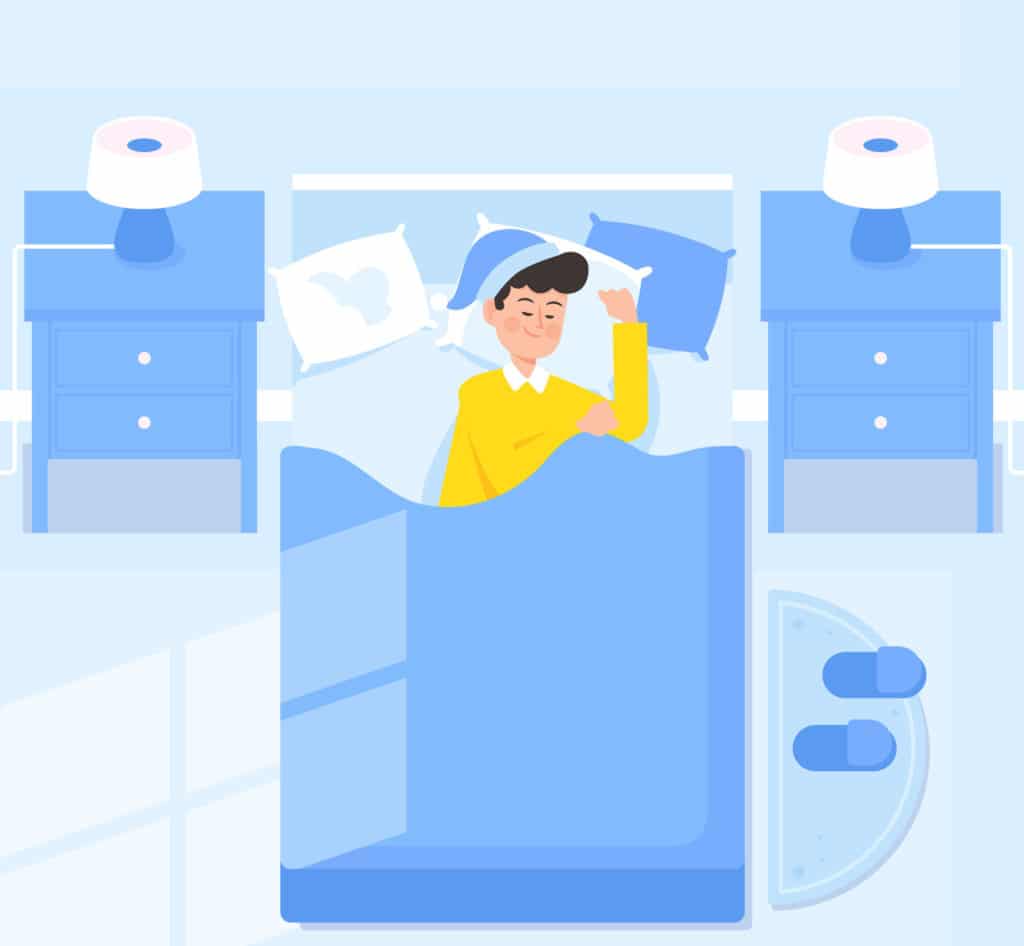
You spend bout 1/3 of your life sleeping. That’s 2920 hours a year, 240 hours a month, and 56 hours per week. The room where you sleep can have a major impact on your sleep quality and quantity.
Here at Rested Health, we want to teach you the habits that have the least effort with the most reward. So, without further ado, here is your guide to building the ultimate sleep sanctuary on any budget.
BUILDING A SLEEP SANCTUARY
Action Plan
Optimize your bedroom for better sleep
The Problem:
Suboptimal sleep environments can lead to difficulty falling asleep, frequent awakenings, and lowered sleep quality.
How to do it

The Science
There are multiple things in your environment that can negatively impact your sleep. Read the Rested Health Comprehensive guide to the Ultimate Sleep Sanctuary for an in-depth look.
Temperature: The temperature of your sleep environment is one of the most important factors that can affect your sleep. Your circadian rhythm causes your body to cool down at night and continue cooling until the wee hours of the morning for the best quality sleep.
Research has shown that heat exposure increases wakefulness and decreases slow-wave sleep and REM sleep. Set your bedroom temperature to around 65℉ (18.3℃) for optimal sleep. You can try a little lower or a little higher until you reach your sweet spot. Feeling cold? Using blankets to keep warm is better than turning up the heat.
Light: Light can be extremely disruptive to good sleep. Ambient light from windows and digital devices in your room suppresses melatonin production. Try using black-out curtains or an eyemask to help keep your sleep system functioning properly. You can also select matte paints for your walls to decrease light reflection. You can help increase melatonin production before bed by using light dimmers, red light bulbs, 40 watt lights, or bedtime friendly bulbs for 2-3 hours leading up to bedtime instead of your normal lighting.
Noise: Environmental noise lowers sleep quality and makes it difficult to maintain deep sleep states. Use earplugs or use a pink (or white) noise machine at night to block out noise pollution. White noise, pink noise, or environmental sounds (such as wind chimes or ocean waves) create a calming environment that helps you relax before falling asleep. They can also block a great deal of noise pollution. As a bonus, pink noise has been shown to improve sleep stability by optimizing brain wave activityAs a bonus, pink noise has been shown to improve sleep stability by optimizing brain wave activity.
Unplug: Blue light emitted from electronics has a powerful effect on your sleep-wake cycle. It boosts wakefulness signals and reduces melatonin (you need melatonin for sleep). In fact, Research has found that blue light from digital devices reduces melatonin two times longer than other types of light. This makes it harder to fall asleep and reduces sleep quality. Cover digital light at night so it doesn’t disrupt your sleep and unplug and put away digital devices at least an hour before bed. (Yes, this means you should remove the TV from your bedroom)
Declutter: Your brain interprets clutter in your bedroom as chaos. This can make it hard to settle your ind before bed. Do your best to keep things neat and tidy or have bins handy to clean up in a bind. Setting a habit of making your bed every morning is a great way to not only reduce clutter, but also boost your morning productivity.
In the sheets: Pay attention to your sheets and mattress and upgrade to cozy options when possible. Most modern day foam mattresses are great options for any budget. When choosing sheets, stick with natural materials like bamboo or cotton, as they are effective at wicking away moisture.

Only use your bed for Sleep (and intimacy)
Due to operant conditioning, stimulating activities in your bed (like watching TV) leads to your brain creating an association between being alert and laying in bed.
SLEEP PRO TIP: Remove all stimuli from your bedroom (known as stimulus control). It’s how therapists help people reset their programming to overcome insomnia!






